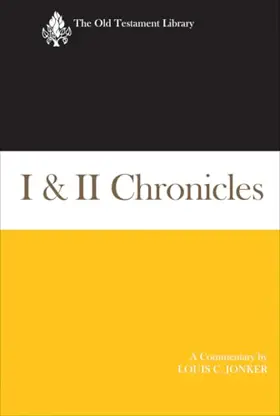

I and II Chronicles
Pages
728
Publisher
Westminster John Knox
Published
3/17/2026
ISBN-13
978-0664263409
In this critical and illuminating volume of the Old Testament Library, internationally respected scholar Louis C. Jonker reveals Chronicles as a dynamic text that reinterprets sacred traditions to help the postexilic Judahite community navigate shifting political and religious landscapes.
Written during the late Persian and early Hellenistic periods, Chronicles offers a bold vision for “all Israel” centered on the Jerusalem Temple, reframing Judah’s identity through genealogies, liturgical reform, and idealized history. Drawing on interdisciplinary methods―including text-pragmatical analysis, social psychology, postcolonial theory, and reception history―Jonker explores how the Chronicler constructs communal memory, reclaims older traditions, and resists imperial dominance by portraying YHWH as the true king.
A distinctive feature of this commentary is Jonker’s proposed diachronic model of composition. He identifies an early priestly-oriented stratum affirming the Davidic monarchy and Aaronide priesthood, followed by a later redactional layer that elevates the Levites―especially in the Hezekiah and Josiah narratives―as spiritual leaders. This evolution signals a broader theological and ideological shift within the community. Jonker also traces the reception of Chronicles through history―from its shaping influence on Ezra-Nehemiah to its use in rabbinic interpretation, feminist biblical scholarship, Jewish visual art, and post-apartheid South African theology.
With fresh insight and scholarly depth, I and II Chronicles: A Commentary reclaims these often-overlooked texts as far more than a retelling of Israel’s past. They are vital witnesses to the theological and communal imagination of a people rebuilding identity in the shadow of empire.
Written during the late Persian and early Hellenistic periods, Chronicles offers a bold vision for “all Israel” centered on the Jerusalem Temple, reframing Judah’s identity through genealogies, liturgical reform, and idealized history. Drawing on interdisciplinary methods―including text-pragmatical analysis, social psychology, postcolonial theory, and reception history―Jonker explores how the Chronicler constructs communal memory, reclaims older traditions, and resists imperial dominance by portraying YHWH as the true king.
A distinctive feature of this commentary is Jonker’s proposed diachronic model of composition. He identifies an early priestly-oriented stratum affirming the Davidic monarchy and Aaronide priesthood, followed by a later redactional layer that elevates the Levites―especially in the Hezekiah and Josiah narratives―as spiritual leaders. This evolution signals a broader theological and ideological shift within the community. Jonker also traces the reception of Chronicles through history―from its shaping influence on Ezra-Nehemiah to its use in rabbinic interpretation, feminist biblical scholarship, Jewish visual art, and post-apartheid South African theology.
With fresh insight and scholarly depth, I and II Chronicles: A Commentary reclaims these often-overlooked texts as far more than a retelling of Israel’s past. They are vital witnesses to the theological and communal imagination of a people rebuilding identity in the shadow of empire.